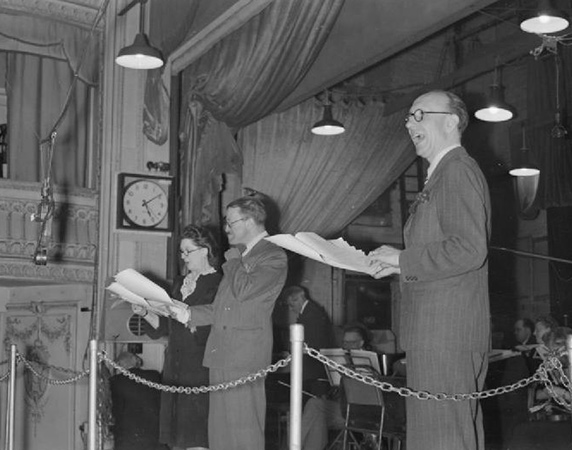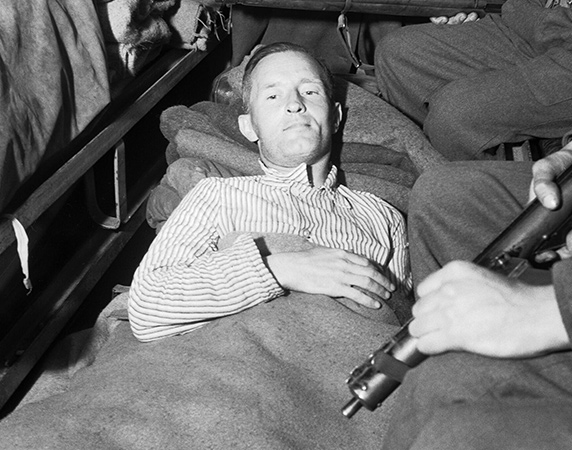During World War II, homeland production became a significant part of the war effort for Allied and Axis powers. The contribution from the various home fronts had an invaluable impact on the war’s resolution. It also uncovered various new issues for governments to deal with, including rationing, manpower allocation, home defense, and evacuation of citizens in the wake of air raids.
In World War I, the powers had learnt from the positive and negative experience, and their mobilization of economic output contributed greatly to supporting combat operations. As well as efforts to boost morale, another campaign that sticks with people were the various scrap drives for metal, rubber, and rags.
Alongside this, the entertainment industry during this period was often controlled by the government to depict the war positively and keep civilian spirits high. The government also censored the majority of mass media entertainment in much of the world, across popular platforms such as radio, film, and music.
Radio
Radio was the cheapest form of entertainment, and it was the most popular medium during World War II. The accessibility and availability meant it fueled propaganda and could reach a large number of citizens. Radio helped entertain and inform the population, encouraging citizens to join in the war effort.
One of the most popular shows in Britain during the time, Tommy Handley's It's That Man Again was able to reach up to 40% of the British population. However, the success of radio propaganda during World War I, went on to inspire fascist and social regimes during World War II. Effective radio propaganda arrived in the form of news reports by Edward. R. Murrow. He covered the Battle of Britain and nightly bombing raids in London, with his vivid imagery capturing the nation’s imaginations.
The Laugh!- the Recording of the Radio Comedy 'itma', London, England, UK, 1945. By Ministry of Information Photo Division Photographer, Smith Norman

In America, broadcasting was offered twenty-four hours a day in an effort to keep citizens engaged, and 90% of American families owned a radio during World War II. However, propaganda was not well received, reminding citizens of the efforts used in World War I. This led President Roosevelt and others to attempt to convince the people that the government was not out to censor information but inform the public. One of the most successful radio program methods the American government used was the “you technique”. This method put the listener directly in situations like battle or being in a military camp by addressing them personally.
In Nazi Germany, radio was an important propaganda tool. Just a few short months after the outbreak of World War II, German propagandists were transmitting close to 11 hours of programming a day, with the majority of the transmissions in English as well. Their focus was on eroding the pro-British sentiment, and propagandists also focused on certain groups such as capitalists, Jews, and specific newspapers and politicians.
The Capture of William Joyce, Germany, 1945. By Hardy, Bert, No 5 Army Film & Photographic Unit

Joseph Goebbels, German propaganda minister, called the radio the “eighth great power”, noting the influence of radio in promoting the Third Reich. Goebbels approved a mandate in which millions of cheap radio sets were subsidized by the government and distributed to citizens. Germans also delivered their messages to occupied territories and enemy states. One of their main targets was the United Kingdom where William Joyce (Lord Haw-Haw) regularly broadcasted. In the United States, there were Robert Henry Best and Mildred Gillars (Axis Sally).
Prominent Shows
In World War II, American GIs in the Pacific and European theatres of war heard anonymous voices on the radio. These played selected American music and pushed the virtues of Japanese and Nazi causes. GIs were encouraged to stop fighting and made false claims of American defeats and Japanese or Nazi victories. They even referred to specific units and individuals. In some instance, they mentioned the names of loved ones back home. GIs dubbed the voice from Japan “Tokyo Rose”; the two from Germany were called “Axis Sally” and “Lord Haw-Haw”.
Tokyo Rose
Iva Toguri had become stranded in Japan after visiting her sick aunt. She had been refused entry back to the United States after the attacks on Pearl Harbor and soon worked at Radio Tokyo as a typist. While some were put off by her early pro-Americanism, they eventually came to trust her.
Radio Tokyo soon wanted a female broadcaster for their “Zero Hour” program, and Toguri was asked for by name. The show itself was a series of propaganda-tinged skits, biased news reports as well as popular American music to degrade morale. Her prominence on the show led her to become branded one of Japan’s most notorious propagandists. After the war, she was arrested and sentenced to 10 years in prison and a $10,000 fine. However, she was later pardoned by President Ford.
Tokyo Rose BroadcastWWIIPublicDomain
Axis Sally
Mildred Gillars was an American broadcaster employed by the Third Reich to proliferate wartime propaganda. While America urged its citizens to return home after the outbreak of the war, Gillars chose to say in Germany because of her fiancé, who was a German citizen. After her husband’s death on the frontlines, she began working as an announcer with Reichs-Rundfunk-Gesellschaft (RRG), German State Radio.
When the attacks on Pearl Harbor occurred, she announced her allegiance to the East. However, faced with imprisonment, she signed an oath of allegiance to Germany. While she had appeared on various chat shows, her biggest success was “Home Sweet Home”. This program was aimed at exploiting fears about the home front, casting doubt and fear. Her other shows included “Midge at the Mike”, “G.I.’s Letter box” and “Medical Reports”, which was peppered with American songs and defeatist propaganda.
Axis Sally broadcastmontaretto72
Gillars was convicted of treason in the United States in 1949; she captured in post-war Berlin. The U.S. attorney general dispatched prosecutor Victor C. Woerheide to find her. He had only one lead: Raymond Kurtz, a B-17 pilot shot down by the Germans. Woerheide eventually found Gillars. She was indicted on September 10, 1948. She was eventually sentenced to 10 to 30 years in prison and a $10,000 fine.
Lord Haw-Haw
William Joyce was German radio’s most prominent English-language speaker. His propaganda show “Germany Calling” was broadcast to audiences in Great Britain on the station Reichssender Hamburg. The program lasted from 1939 to 1945, when the British Army overran Hamburg. His show attempted to demoralize British, Canada, Australian and American troopers, as well as the British population within broadcast range. While the British public were discouraged from listening to the show, almost 6-million regular and 18-million occasionally listens tuned in across Great Britain.
Lord Haw-Haw broadcastAbsit
At the end of the war, he was captured by British forces at Flensburg, close to the German border at Denmark. Troops spotted a disheveled man gathering firewood. When he was questioned by them, he reached for his fake passports. Believing this an act of aggression, he was fired on by soldiers. He was then convicted and sentenced to death on September 19, 1945.